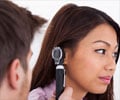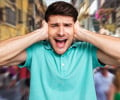Causes of Permanent Hearing Loss
Presbycusis or Age-related Hearing Loss: As the name suggests, this kind of hearing loss occurs as a degenerative process due to ageing. Hearing loss is usually progressive, bilateral sensorineural loss. Ageing process also involves the loss of cochlear outer hair cells, ganglion cell loss in the vestibulocochlear nerve fibres and stiffness of cochlear basilar membrane. Atrophy of the vascular stria in the lateral cochlear wall is one of the most important reasons of hearing loss due to aging.
The hearing loss is predominantly present in sounds of high frequencies like ‘S’, ‘sh’, ‘f’ etc. This in turn affects speech discrimination, that is, the person can hear the speech but can’t hear it clear enough to understand. Presence of background noise or speaking in a group can cause some trouble in understanding speech.
Meniere’s disease: It is a condition in which there is a change in the fluid volume, called endolymph, in the membranous labyrinth of the vesibular apparatus in the ear. Tinnitus, vertigo and fluctuating hearing loss are the most important symptoms of Meniere’s disease.
Acoustic neuroma: These are the tumors of the vestibulocochlear nerve that arise from the Schwann cells of the nerve sheath. Although their growth is benign, they can create pressure in the local structures and can also become life-threatening. Symptoms include sudden and complete unilateral hearing loss, fluctuating hearing loss, subtle disturbances in balance, tinnitus, etc.
The pressure on local structures can create disturbances like facial pain, numbness or facial muscle weakness and earache. If the cerebellum and the brain stem are compressed, ataxia, persistent headache, hydrocephalus with visual loss and sometimes decreased level of consciousness can occur. Acoustic neuroma usually occurs unilaterally, but in rare cases, bilateral acoustic neuroma is also a possibility.
Noise-Induced Hearing loss: This kind of hearing loss typically occurs due to exposure to high levels of noise constantly for a long period of time. This can be an occupational hazard in certain factories and industries. Initially, exposure to loud noise for a limited period of time typically causes a temporary hearing loss that recovers in time. However, repeated exposure to sufficiently intense noises can result in a permanent shift in the threshold of hearing.
Exposure to loud music in rock concerts or even via headphones from ipods and mobile phones can damage the hair cells in the inner ear and cause noise-induced hearing loss.
The symptoms of noise-induced hearing loss include temporary difficulty in hearing that can progress gradually, accompanied by tinnitus. The condition can be managed at the right time, with the use of protective devices like ear muffs and ear plugs, especially in factories and industries. Ignoring the temporary threshold shift can lead to permanent hearing loss.
Ototoxic hearing loss: Some drugs including aminoglycosides, cis-platinum, quinine, etc are known to cause damage to hair cells of the cochlea and result in hearing loss. The symptoms include tinnitus, balance problems, feeling of pressure within the ears, etc., which may occur even after weeks or months after taking the drugs. The hearing loss can be permanent and may need amplification with a hearing aid.
Various other causes of permanent hearing loss include:
- Diabetes
- Multiple neurosis
- Muscular dystrophies
- Paget’s disease of bone
- Infections such as scarlet fever, typhoid, encephalitis
- Trauma or fracture to the temporal bone
- Pyrexia
- Perilymph fistula
Mixed Hearing loss
Hearing impairment that is caused due to middle ear and inner ear damage is called mixed hearing loss. Corrections can be done for the damage in the middle ear, but inner ear damages cannot be reversed. Conditions like chronic otitis media and otosclerosis can result in mixed hearing loss as these diseases arise from the middle ear and proceed towards damaging the inner ear.
Functional Hearing Loss
Functional hearing loss, also called pseudohypacusis, refers to the deafness that results from various psychological or emotional factors. Other terms used are malingering, psychogenic hearing loss, exaggerated hearing loss and non-organic hearing loss.
Patient may enact presence of hearing impairment for legal reasons like getting a certificate or expecting compensation due to loud noise in factory. An audiometric test for the patient can reveal the feigning of hearing loss. Poor test-retest reliability can give away the patient at the very beginning. Bone conduction thresholds could be poorer than air conduction and there is a typical pattern of the audiogram for a person who is feigning a hearing loss. Other tests like Immitance audiometry and acoustic reflex threshold can reveal the false hearing loss.
Functional hearing loss due to psychological factors can show poor test-retest reliability and unreliable responses to audiometry. History of depression and any other underlying psychological condition can also help in revealing the presence of psychosomatic hearing loss.
Management of Hearing Loss
Management of hearing impairment depends on the causes and location of the problem. Most conductive hearing impairments can be corrected with antibiotics, surgery or other procedures, either partially or fully. Some of the conductive hearing loss can proceed to become permanent if not treated properly.
Managing the deafness or hearing impairment is mostly possible surgically for problems in the outer or middle ear. For others, the right kind of amplification using a hearing aid is required for the person to be integrated into society.
5 Tips To Protect Your Hearing
- Using Earplugs - The loud and long you are exposed to noise, the more you are prone to loss of hearing. Keep your ears protected with earplugs or ear muffflers and move away from the noise as fast as you can.
- Wearing Headphones - When listening to your favorite music, choose noise canceling headphones. These headphones block sounds from the background and give more clarity to the music you are listening. However, it is also good to minimize the use of headphones continuously for long durations. Take regular breaks from your headphones, to give rest to your ears.
- Turn Down The Volume - While watching TV, or listening to the radio, the down the volume. Turning down the volume even 1 notch can make a huge difference and this can protect the risk of damage to your hearing.
- Ear Protectors - If you work at a construction site, or if you work with noisy equipments like drills, saws and lawn mowers, always wearing ear protectors.
- Hearing Detox - Give your ears time to rest and recover after being exposed to loud sounds. At least 16 hours of rest is required for your ears to recover from a 100dB sound.















